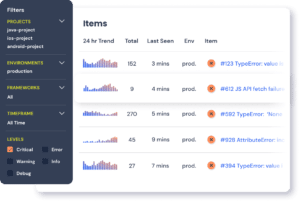InvocationTargetException is a confusing error message that Java developers often encounter. The good news? It's not the real problem - it's just Java's way of saying "something went wrong inside a method I tried to run for you."
Think of it like a delivery person telling you "I couldn't deliver your package because there was a problem at the destination." The InvocationTargetException is the delivery person's message, but the real issue is what happened at the destination (inside your actual method).
What Causes InvocationTargetException
The InvocationTargetException occurs mainly when working with the Java reflection API to invoke a method or constructor, which throws an exception.
This underlying exception is the actual cause of the issue, therefore resolving the InvocationTargetException equates to finding and resolving the underlying exception that occurs within the invoked method.
InvocationTargetException Example
Here is an example of a InvocationTargetException thrown when a method that is called using Method.invoke() throws an exception:
import java.lang.reflect.InvocationTargetException;
import java.lang.reflect.Method;
public class InvocationTargetExceptionExample {
public int divideByZero() {
return 1 / 0;
}
public static void main(String[] args) throws NoSuchMethodException, IllegalAccessException {
InvocationTargetExceptionExample itee = new InvocationTargetExceptionExample();
Method method = InvocationTargetExceptionExample.class.getMethod("divideByZero");
try {
method.invoke(itee);
} catch (InvocationTargetException ite) {
ite.printStackTrace();
}
}
}
In this example, the main() method invokes divideByZero() using Method.invoke(). Since divideByZero() throws an ArithmeticException, it is wrapped within an InvocationTargetException thrown in the main() method:
java.lang.reflect.InvocationTargetException
at java.base/jdk.internal.reflect.NativeMethodAccessorImpl.invoke0(Native Method)
at java.base/jdk.internal.reflect.NativeMethodAccessorImpl.invoke(NativeMethodAccessorImpl.java:62)
at java.base/jdk.internal.reflect.DelegatingMethodAccessorImpl.invoke(DelegatingMethodAccessorImpl.java:43)
at java.base/java.lang.reflect.Method.invoke(Method.java:564)
at InvocationTargetExceptionExample.main(InvocationTargetExceptionExample.java:13)
Caused by: java.lang.ArithmeticException: / by zero
at InvocationTargetExceptionExample.divideByZero(InvocationTargetExceptionExample.java:6)
... 5 more
Common Scenarios Where InvocationTargetException Occurs
In IDE Development (Eclipse, IntelliJ)
When running applications through IDEs, you might encounter InvocationTargetException during:
- Plugin initialization
- Build tool execution
- Test framework setup
In Testing Frameworks (Selenium, JUnit)
Testing frameworks frequently use reflection, making InvocationTargetException common when:
- Test methods throw unexpected exceptions
- WebDriver initialization fails
- Test setup/teardown methods encounter issues
In Spring Boot Applications
Spring's extensive use of reflection can trigger InvocationTargetException during:
- Bean instantiation
- Annotation processing
- Auto-configuration
How to Resolve InvocationTargetException
Since the underlying exception is the actual cause of the InvocationTargetException, finding and resolving the underlying exception resolves the InvocationTargetException. The getCause() method of the Throwable class can be used to obtain the underlying exception. The earlier example can be updated accordingly to get the underlying exception and print its stack trace:
import java.lang.reflect.InvocationTargetException;
import java.lang.reflect.Method;
public class InvocationTargetExceptionExample {
public int divideByZero() {
return 1 / 0;
}
public static void main(String[] args) throws NoSuchMethodException {
InvocationTargetExceptionExample itee = new InvocationTargetExceptionExample();
Method method = InvocationTargetExceptionExample.class.getMethod("divideByZero");
try {
method.invoke(itee);
} catch (InvocationTargetException ite) {
Throwable underlyingException = ite.getCause();
underlyingException.printStackTrace();
} catch (IllegalAccessException iae) {
iae.printStackTrace();
}
}
}
Running the above will print out the stack trace of the underlying ArithmeticException:
java.lang.ArithmeticException: / by zero
at InvocationTargetExceptionExample.divideByZero(InvocationTargetExceptionExample.java:6)
at java.base/jdk.internal.reflect.NativeMethodAccessorImpl.invoke0(Native Method)
at java.base/jdk.internal.reflect.NativeMethodAccessorImpl.invoke(NativeMethodAccessorImpl.java:62)
at java.base/jdk.internal.reflect.DelegatingMethodAccessorImpl.invoke(DelegatingMethodAccessorImpl.java:43)
at java.base/java.lang.reflect.Method.invoke(Method.java:564)
at InvocationTargetExceptionExample.main(InvocationTargetExceptionExample.java:13)The stack trace can then be inspected to resolve the underlying exception. This will also resolve the wrapped InvocationTargetException.
Interpreting Common Underlying Exceptions
When you call getCause(), look for these frequent culprits:
- ArithmeticException: Division by zero or invalid math operations
- NullPointerException: Attempting to use null references
- IllegalArgumentException: Invalid parameters passed to the method
- ClassNotFoundException: Missing dependencies or classpath issues
- NoSuchMethodException: Method signature mismatches
Track, Analyze and Manage Java Errors With Rollbar

Managing errors and exceptions in your code is challenging. It can make deploying production code an unnerving experience. Being able to track, analyze, and manage errors in real-time can help you to proceed with more confidence. Rollbar automates Java error monitoring and triaging, making fixing errors easier than ever. Try it today.



